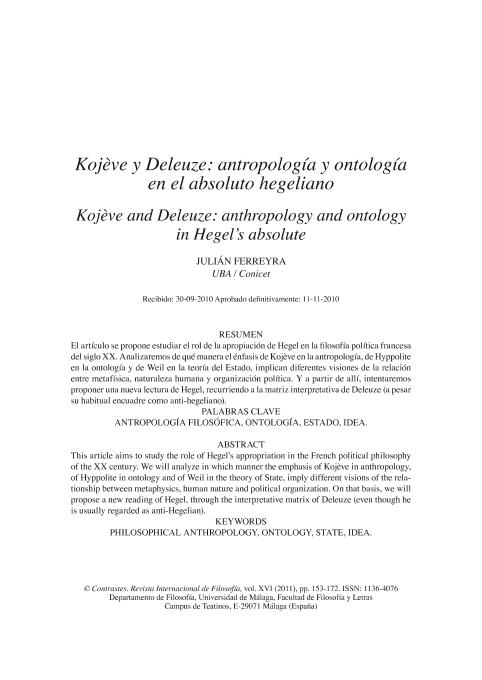Artículo
El artículo se propone estudiar el rol de la apropiación de Hegel en la filosofía política francesa del siglo XX. Analizaremos de qué manera el énfasis de Kojève en la antropología, de Hyppolite en la ontología y de Weil en la teoría del Estado, implican diferentes visiones de la relación entre metafísica, naturaleza humana y organización política. Y a partir de allí, intentaremos proponer una nueva lectura de Hegel, recurriendo a la matriz interpretativa de Deleuze (a pesar su habitual encuadre como anti-hegeliano). This article aims to study the role of Hegel’s appropriation in the French political philosophy of the XX century. We will analyze in which manner the emphasis of Kojève in anthropology, of Hyppolite in ontology and of Weil in the theory of State, imply different visions of the relationship between metaphysics, human nature and political organization. On that basis, we will propose a new reading of Hegel, through the interpretative matrix of Deleuze (even though he is usually regarded as anti-Hegelian).
Kojève y Deleuze: antropología y ontología en el absoluto hegeliano
Título:
Kojève and Deleuze: anthropology and ontology in Hegel’s absolute
Fecha de publicación:
11/2010
Editorial:
Universidad de Málaga
Revista:
Contrastes
ISSN:
1136-4076
e-ISSN:
2659-921X
Idioma:
Español
Tipo de recurso:
Artículo publicado
Clasificación temática:
Resumen
Palabras clave:
ANTROPOLOGÍA FILOSÓFICA
,
ONTOLOGÍA
,
ESTADO
,
IDEA
Archivos asociados
Licencia
Identificadores
Colecciones
Articulos(SEDE CENTRAL)
Articulos de SEDE CENTRAL
Articulos de SEDE CENTRAL
Citación
Ferreyra, Diego Julián; Kojève y Deleuze: antropología y ontología en el absoluto hegeliano; Universidad de Málaga; Contrastes; 16; 11-2010; 153-172
Compartir
Altmétricas




